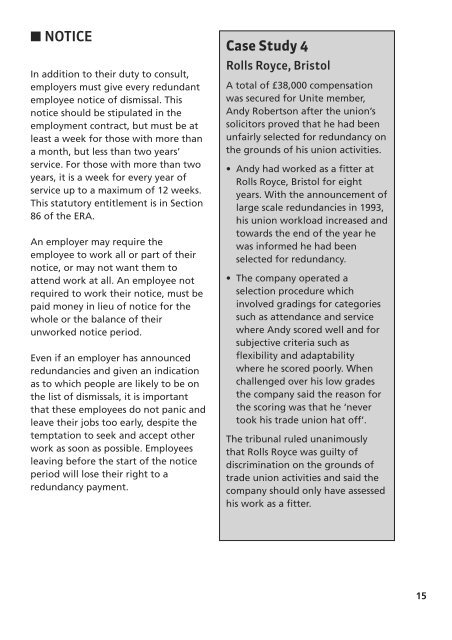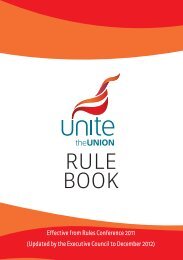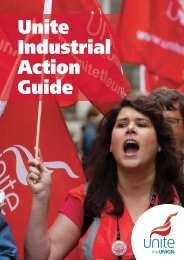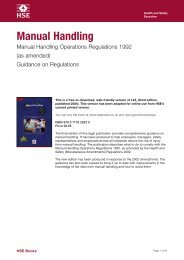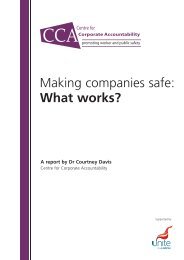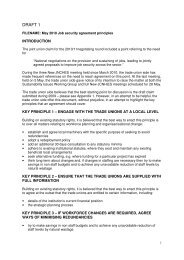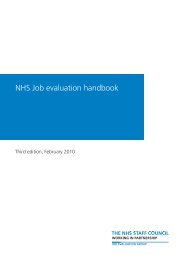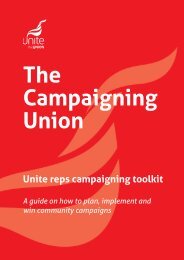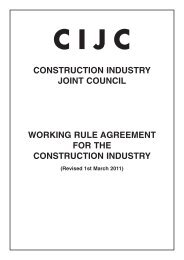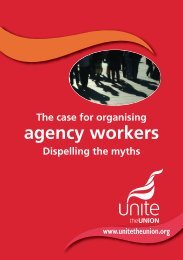Redundancy - Unite the Union
Redundancy - Unite the Union
Redundancy - Unite the Union
You also want an ePaper? Increase the reach of your titles
YUMPU automatically turns print PDFs into web optimized ePapers that Google loves.
n NOTICE<br />
In addition to <strong>the</strong>ir duty to consult,<br />
employers must give every redundant<br />
employee notice of dismissal. This<br />
notice should be stipulated in <strong>the</strong><br />
employment contract, but must be at<br />
least a week for those with more than<br />
a month, but less than two years’<br />
service. For those with more than two<br />
years, it is a week for every year of<br />
service up to a maximum of 12 weeks.<br />
This statutory entitlement is in Section<br />
86 of <strong>the</strong> ERA.<br />
An employer may require <strong>the</strong><br />
employee to work all or part of <strong>the</strong>ir<br />
notice, or may not want <strong>the</strong>m to<br />
attend work at all. An employee not<br />
required to work <strong>the</strong>ir notice, must be<br />
paid money in lieu of notice for <strong>the</strong><br />
whole or <strong>the</strong> balance of <strong>the</strong>ir<br />
unworked notice period.<br />
Even if an employer has announced<br />
redundancies and given an indication<br />
as to which people are likely to be on<br />
<strong>the</strong> list of dismissals, it is important<br />
that <strong>the</strong>se employees do not panic and<br />
leave <strong>the</strong>ir jobs too early, despite <strong>the</strong><br />
temptation to seek and accept o<strong>the</strong>r<br />
work as soon as possible. Employees<br />
leaving before <strong>the</strong> start of <strong>the</strong> notice<br />
period will lose <strong>the</strong>ir right to a<br />
redundancy payment.<br />
Case Study 4<br />
Rolls Royce, Bristol<br />
A total of £38,000 compensation<br />
was secured for <strong>Unite</strong> member,<br />
Andy Robertson after <strong>the</strong> union’s<br />
solicitors proved that he had been<br />
unfairly selected for redundancy on<br />
<strong>the</strong> grounds of his union activities.<br />
• Andy had worked as a fitter at<br />
Rolls Royce, Bristol for eight<br />
years. With <strong>the</strong> announcement of<br />
large scale redundancies in 1993,<br />
his union workload increased and<br />
towards <strong>the</strong> end of <strong>the</strong> year he<br />
was informed he had been<br />
selected for redundancy.<br />
• The company operated a<br />
selection procedure which<br />
involved gradings for categories<br />
such as attendance and service<br />
where Andy scored well and for<br />
subjective criteria such as<br />
flexibility and adaptability<br />
where he scored poorly. When<br />
challenged over his low grades<br />
<strong>the</strong> company said <strong>the</strong> reason for<br />
<strong>the</strong> scoring was that he ‘never<br />
took his trade union hat off’.<br />
The tribunal ruled unanimously<br />
that Rolls Royce was guilty of<br />
discrimination on <strong>the</strong> grounds of<br />
trade union activities and said <strong>the</strong><br />
company should only have assessed<br />
his work as a fitter.<br />
15


